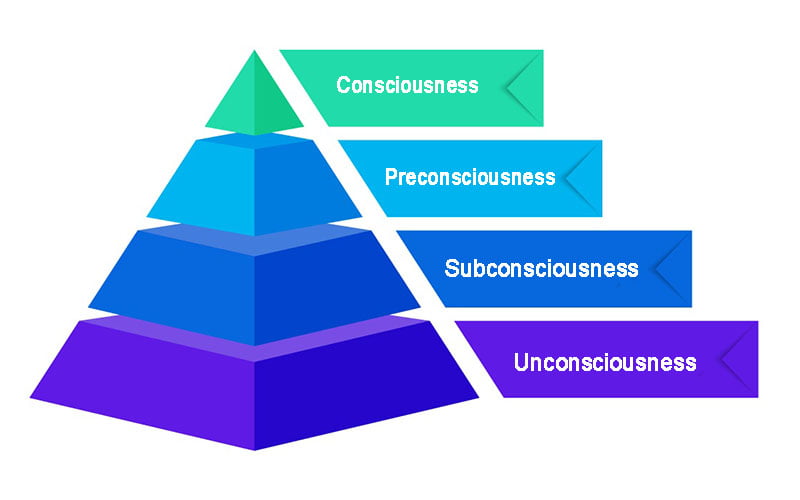
In the realm of psychology and spirituality, the concept of consciousness has long intrigued philosophers, scientists, and thinkers alike. The level of consciousness refers to the degree of awareness one has of themselves and their surroundings. It encompasses our thoughts, perceptions, emotions, and experiences. This article aims to provide a deep understanding of the level of consciousness, exploring its various dimensions and shedding light on its significance in human existence.
Consciousness can be defined as the state of being awake and aware of one’s surroundings. It involves the ability to perceive, process information, and experience subjective sensations. Consciousness is a multifaceted phenomenon that plays a crucial role in shaping our perception of reality and influencing our behavior.
Consciousness exists on a spectrum, ranging from lower levels to higher levels. At the lower end of the spectrum, we find states like deep sleep or unconsciousness, where awareness is minimal or absent. As we ascend the spectrum, we encounter states of wakefulness, self-awareness, and expanded consciousness, where individuals exhibit heightened awareness and a greater connection to the world around them.
Preconsciousness refers to the mental activities that are outside our immediate awareness but can be easily accessed if needed. It involves memories, thoughts, and emotions that are not in the forefront of our consciousness but can be recalled with some effort.
Consciousness, as we experience it in our everyday lives, involves the awareness of our thoughts, feelings, sensations, and external stimuli. It is the state of being present and fully engaged with our surroundings.
The subconscious mind operates below the level of conscious awareness and influences our behavior and thoughts. It stores memories, beliefs, and experiences that shape our perceptions and actions, often without us being consciously aware of them.
The unconscious mind represents the deepest level of consciousness. It holds repressed memories, desires, and instincts that are not accessible to our conscious awareness. Freudian psychoanalysis suggests that the unconscious mind significantly influences our behavior and personality.
Sleep is an essential aspect of human life, providing rest and restoration to our physical and mental well-being. During sleep, our consciousness undergoes changes, leading to dreams and the exploration of the subconscious realm. Dreams offer a window into the deeper aspects of our psyche, unveiling hidden desires, fears, and emotions.
Meditation and mindfulness practices have been used for centuries to cultivate a heightened level of consciousness. These practices involve focusing the mind, quieting the mental chatter, and achieving a state of inner peace and clarity. By engaging in meditation, individuals can transcend their ordinary level of consciousness and tap into a more profound sense of self-awareness.
Psychedelic substances, such as psilocybin mushrooms or LSD, have been known to induce altered states of consciousness. These experiences often involve heightened sensory perceptions, altered thinking patterns, and a dissolution of the boundaries between the self and the external world. Research suggests that psychedelic therapy can have profound effects on mental health and well-being.
By delving into the depths of consciousness, individuals can gain a better understanding of themselves and their inner motivations. This self-exploration journey can lead to personal growth, increased self-acceptance, and the ability to make more informed choices aligned with one’s true desires.
Understanding the level of consciousness allows us to develop a deeper sense of connection and empathy towards others. It helps us recognize that we are all interconnected and share a common human experience. This awareness can foster compassion, understanding, and harmonious relationships.
Expanding our level of consciousness opens up new possibilities for perception and understanding. It allows us to transcend limited viewpoints and embrace a more holistic perspective. With an expanded awareness, we can tap into our innate creativity, intuition, and problem-solving abilities.
A1: Consciousness and the brain have a complex and intertwined relationship. While the brain is undoubtedly involved in generating and facilitating conscious experiences, the exact nature of this relationship is still a subject of ongoing scientific exploration.
A2: Certain transformative experiences, such as spiritual awakenings or profound psychological insights, have the potential to bring about lasting changes in one’s level of consciousness. However, the degree and permanence of such alterations may vary from person to person.
A3: Altered states of consciousness, when approached with intention and proper guidance, can have numerous potential benefits. They can facilitate self-exploration, spiritual growth, and therapeutic breakthroughs. However, it is essential to approach these states with caution and respect for individual differences.
A4: Consciousness is not exclusive to humans. Many animals display varying degrees of consciousness and self-awareness. Research has shown that animals such as dolphins, elephants, and primates possess cognitive abilities that indicate a level of consciousness.
A5: The question of whether consciousness can exist independently of the physical body is a topic of philosophical and metaphysical debate. While some spiritual and philosophical traditions propose the existence of a transcendent consciousness beyond the physical realm, empirical evidence for such claims remains elusive.
A6: Measuring consciousness objectively is a significant challenge due to its subjective nature. Various scientific methods, such as brain imaging techniques and behavioral assessments, can provide insights into certain aspects of consciousness. However, a comprehensive and universally accepted measure of consciousness is yet to be developed.
The level of consciousness is a captivating and intricate aspect of human existence. From the depths of the unconscious mind to the expansiveness of higher states, consciousness shapes our perception, behavior, and overall experience of reality. By exploring and understanding the different levels of consciousness, we can embark on a transformative journey of self-discovery, empathy, and personal growth.
Recommended other topics: Catatonic Schizophrenia: Symptoms, Causes & Diagnosis










© InfoDoot. All Rights Reserved.